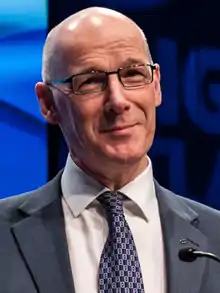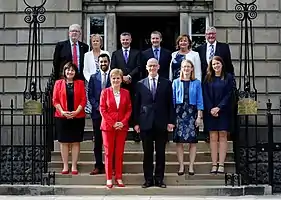John Swinney
John Ramsay Swinney (born 13 April 1964) is a Scottish politician serving as Deputy First Minister of Scotland since 2014 and Cabinet Secretary for Education and Skills since 2016. A member of the Scottish National Party (SNP), Swinney has also served as the Member of the Scottish Parliament (MSP) for Perthshire North since 2011, having previously represented North Tayside from 1999 to 2011.
John Swinney | |||||||||||||||||||||||||||||||||||
|---|---|---|---|---|---|---|---|---|---|---|---|---|---|---|---|---|---|---|---|---|---|---|---|---|---|---|---|---|---|---|---|---|---|---|---|
 Swinney in 2017 | |||||||||||||||||||||||||||||||||||
| Deputy First Minister of Scotland | |||||||||||||||||||||||||||||||||||
| Assumed office 21 November 2014 | |||||||||||||||||||||||||||||||||||
| First Minister | Nicola Sturgeon | ||||||||||||||||||||||||||||||||||
| Preceded by | Nicola Sturgeon | ||||||||||||||||||||||||||||||||||
| Cabinet Secretary for Education and Skills | |||||||||||||||||||||||||||||||||||
| Assumed office 18 May 2016 | |||||||||||||||||||||||||||||||||||
| First Minister | Nicola Sturgeon | ||||||||||||||||||||||||||||||||||
| Preceded by | Angela Constance Roseanna Cunningham | ||||||||||||||||||||||||||||||||||
| |||||||||||||||||||||||||||||||||||
| |||||||||||||||||||||||||||||||||||
| Personal details | |||||||||||||||||||||||||||||||||||
| Born | John Ramsay Swinney 13 April 1964 Edinburgh, Scotland | ||||||||||||||||||||||||||||||||||
| Nationality | Scottish | ||||||||||||||||||||||||||||||||||
| Political party | Scottish National Party | ||||||||||||||||||||||||||||||||||
| Spouse(s) | Lorna King
(m. 1991; div. 1998)Elizabeth Quigley (m. 2003) | ||||||||||||||||||||||||||||||||||
| Children | 3 | ||||||||||||||||||||||||||||||||||
| Relatives | Tom Hunter VC (uncle) | ||||||||||||||||||||||||||||||||||
| Alma mater | University of Edinburgh | ||||||||||||||||||||||||||||||||||
| Occupation | Management consultant | ||||||||||||||||||||||||||||||||||
| Website | Official website | ||||||||||||||||||||||||||||||||||
Swinney served in the British House of Commons as Member of Parliament for Tayside North from 1997 to 2001. After Alex Salmond resigned the leadership in 2000, Swinney was elected Leader of the Scottish National Party in the ensuring leadership election.[1] Swinney's leadership proved ineffectual, with a loss of one MP in 2001 and a further reduction to 27 MSPs in 2003 despite the Officegate scandal unseating previous First Minister Henry McLeish.[2] However, the only parties to gain seats in that election where the Scottish Greens and the Scottish Socialist Party (SSP) which like the SNP support independence. After an unsuccessful coup attempt in 2003, Swinney stepped down following disappointing results in the European elections of 2004[3] with Salmond elected in the subsequent 2004 leadership contest.
The SNP won the highest number of seats in the Scottish Parliament in the 2007 election and Salmond was subsequently appointed First Minister. Swinney served under Salmond as Cabinet Secretary for Finance, Employment and Sustainable Growth from 2007 to 2014. After Nicola Sturgeon succeeded Salmond, she appointed Swinney as Deputy First Minister of Scotland in 2014. He also served as Cabinet Secretary for Finance, Constitution and Economy, until that role was divided into two posts in the second Sturgeon government as a result of the expansion of the Scottish Parliament's financial powers; he was then appointed Education Secretary.
Early life
Swinney was born in the Western General Hospital, Edinburgh, the son of Kenneth Swinney, a garage manager. His uncle Tom Hunter was awarded the Victoria Cross whilst serving with the Royal Marines in World War II.[4] He was educated at Forrester High School, before attending the University of Edinburgh, where he graduated with an MA Honours degree in politics in 1986.
Early political career
Swinney joined the SNP at the age of 15, citing his anger at the way in which Scotland had been portrayed by television commentators at the Commonwealth Games. He involved himself in the SNP Youth Wing[5] and gradually became more active in the party, becoming firstly the SNP assistant national secretary and then the national secretary in 1986, at the age of 22.
Swinney was a research officer for the Scottish Coal Project (1987–1988), a senior management consultant with Development Options (1988–1992), and a strategic planning principal with Scottish Amicable (1992–1997). In the SNP, he served as national secretary until 1992, then vice convenor, later senior vice-convenor (deputy leader) 1992–1997. At the time of the 1990 leadership contest he supported Margaret Ewing in her bid to become SNP leader, but this did not stop him becoming politically close to the man who went on to win that contest, Alex Salmond.
Political career
House of Commons
At the 1997 general election, he was elected as Member of Parliament (MP) for the Tayside North constituency, and in 1999 he was elected to represent the same area at the Scottish Parliament.
He stood down as a Westminster MP at the 2001 general election in order to avoid splitting his time, in line with all of his colleagues who found themselves in a similar 'dual mandate' position.
Leader of the SNP
.jpg.webp)
The leadership contest in 2000, caused by Alex Salmond's decision to step down as party leader, was marked by serious argument between the Gradualist wing of the party, who in the main supported Swinney and the Fundamentalist wing, who in the main supported Alex Neil. Swinney won the contest but the media raised some doubt about his ability to lead the party following poor SNP performances in the 2001 UK General Election and the 2003 Scottish Parliamentary Election. He defeated a leadership challenge from Bill Wilson in 2003, defeating Wilson by 577 votes to 111.
Though retaining its two seats at the 2004 European elections, in a smaller field of 7 (Scotland up until then had 8 MEPs) the Scottish press and certain elements within the fundamentalist wing of the Party depicted the result as a disaster for the SNP putting further pressure on Swinney who resigned soon afterwards on 22 June 2004.
Finance Secretary
After the SNP emerged as the largest party following the 2007 Scottish Parliament Election, Swinney led coalition talks with the Scottish Green Party.[6] He was later appointed Cabinet Secretary for Finance and Sustainable Growth in the Cabinet of the minority SNP government.[7]
As response to Swinney not notifying the Scottish Parliament that he had let the Scottish Variable Rate lapse due to not funding this tax mechanism, the Scottish Parliament voted to censure him and called his actions "an abuse of power".[8] Subsequently, a freedom of information request showed that even if Swinney had funded the mechanism, problems and delays in the HM Revenue & Customs computer system made any collection of the tax impossible. The Scottish Government added, "The power has not lapsed, the HMRC simply does not have an IT system capable of delivering a ten-month state of readiness."[9][10]
Cabinet Secretary for Education

Following the election of the SNP to lead the Scottish Government following the 2016 Scottish Parliamentary elections, Swinney, for the first time in nine years, was shifted from his roles as Cabinet Secretary for the Economy to Cabinet Secretary for Education and Skills.[11]
In August 2020 he was subject to a vote of no confidence in Parliament, with the Conservatives, Labour and the Liberal Democrats all accusing Swinney of creating an exam results system which “unfairly penalised pupils at schools which had historically not performed so well”.[12] However the No Confidence vote tabled by Iain Gray of the Scottish Labour party, was defeated by 67 votes to 58 resulting in John Swinney surviving the vote and remaining as Scottish Education Secretary.
Personal life
He joined the Scottish National Party in 1979 at the age of 15 and has held several posts within the party at local and national level, including National Secretary, Vice Convener for Publicity and Depute Leader. In 2000, Swinney was elected Leader (or National Convenor) of the SNP, becoming Leader of the Opposition in the Scottish Parliament. He stood down as SNP leader in 2004 and became Convener of the Scottish Parliament's European and External Relations Committee.
Swinney was previously a Member of Parliament (MP) for Tayside North in the House of Commons of the United Kingdom, before taking the same seat in the Scottish Parliament's 1999, 2003 and 2007 elections. In 2007 he achieved the largest constituency vote for any candidate in Scotland. At the election in May 2011, he was re-elected with 18,219 votes, and a majority of 10,353. Swinney's vote was the second highest in Scotland, second only to the then First Minister, Alex Salmond MSP.
Following Nicola Sturgeon taking the office of First Minister, it was announced on 21 November 2014 that Swinney would become Deputy First Minister of Scotland in a cabinet reshuffle.[13]
Born in Edinburgh, Swinney was educated at the University of Edinburgh, and prior to his election to the UK Parliament in 1997, he was employed as Strategic Planning Principal with Scottish Amicable. Swinney is married and has three children.
References
- "BBC NEWS | In Depth | Conferences | SNP | Emphatic SNP win for Swinney". BBC. Retrieved 5 April 2020.
- "McLeish steps down". 8 November 2001. Retrieved 5 April 2020.
- "Euro poll was breaking point for Swinney". The Scotsman. Retrieved 5 April 2020.
- Fraser, Gemma (30 March 2010). "School's Victoria Cross hero honoured at memorial move". The Scotsman article. Edinburgh: The Scotsman. Retrieved 12 April 2010.
- Young, Andrew (11 May 1983). "TV-am may have the morning off". The Herald. Glasgow. p. 1. Retrieved 1 June 2016.
- "SNP tipped to bring in Greens for minority rule", Edinburgh Evening News, 11 May 2007
- "Salmond announces his new cabinet". BBC News. 16 May 2007.
- "John Swinney says sorry over tax power giveaway". Telegraph.co.uk. 24 November 2010.
- Barnes, Eddie (16 January 2011). "UK taxman killed off Tartan Tax". The Scotsman. Retrieved 1 June 2016.
- UK taxman killed off Tartan Tax Archived 19 January 2011 at the Wayback Machine
- "Scottish cabinet reshuffle: John Swinney becomes education secretary". 18 May 2016 – via www.bbc.co.uk.
- "Education Secretary John Swinney faces no-confidence vote". 12 August 2020 – via www.bbc.co.uk.
- "New First Minister Nicola Sturgeon to announce Cabinet reshuffle". STV News. Archived from the original on 23 November 2014.
External links
| Wikimedia Commons has media related to John Swinney. |
- John Swinney MSP
- Scottish Parliament – John Swinney MSP
- Hansard 1803–2005: contributions in Parliament by John Swinney